2024 Digital Marketing Trends Report – SEO Thought Leadership Predictions
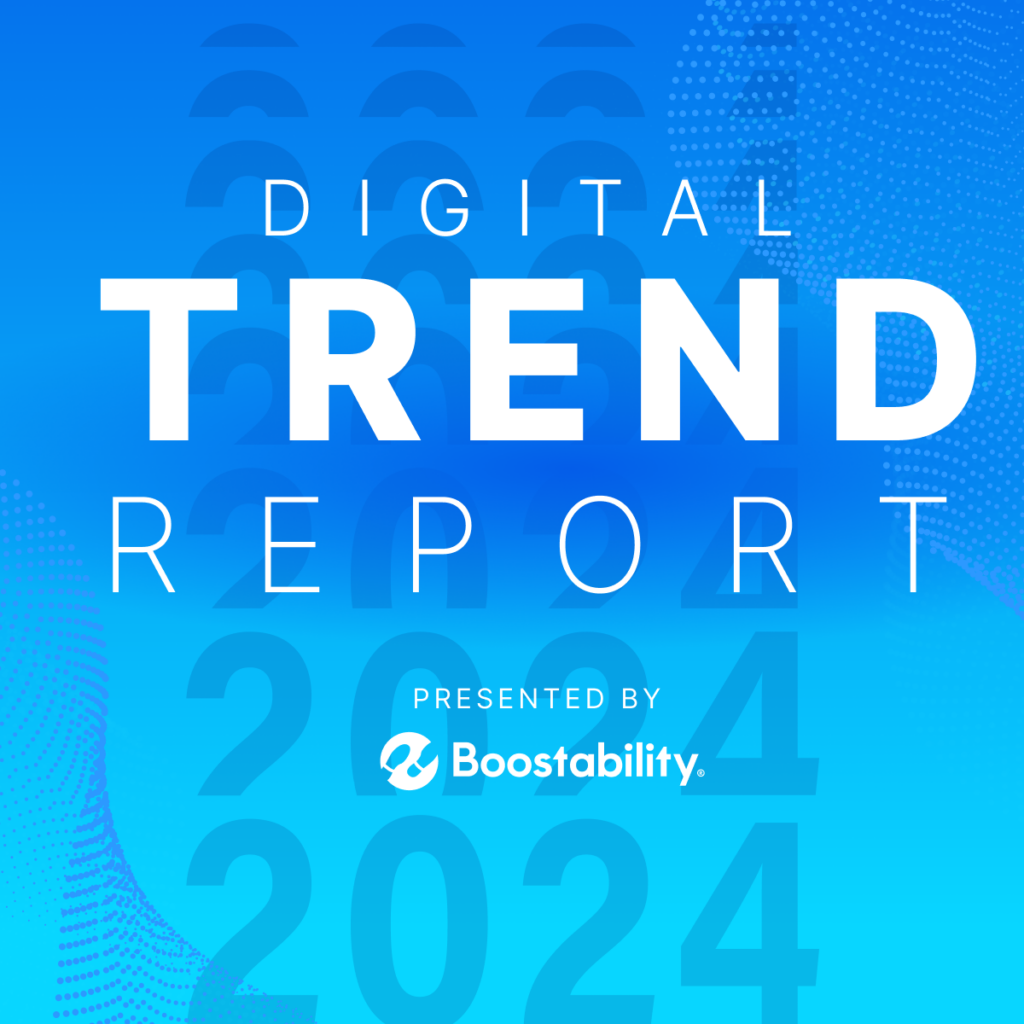
It’s that time of the year again to focus on predictions and trends that are upcoming in the digital marketing world. We always know that marketing, technology, advertising, and AI advancements are constantly evolving and changing.
There’s never a way to put a pause on things to take it all in when updates are constantly happening and evolving. However, while we can’t put a pause on things, we can help you be prepared for when those updates occur. It’s always wise to be ahead of the curve and be informed and updated on how you can best be prepared for these changes when they occur.
In this report, you’ll discover the trends and tactics your business needs to focus on to be successful in your SEO and supporting digital marketing efforts in 2024. Let’s get started!
2024 Digital Marketing Trends
Staying well-informed about the latest developments in digital marketing and your industry is crucial for a clear understanding of new trends. Regularly acquainting yourself with updates, assessing changes in relevance, and staying connected with reliable sources are effective ways to achieve this. It is essential to stay ahead of industry insights and maintain connections with experts and leaders who shape strategies, such as those at Google.
Over the past few months, we have engaged in conversations with CEOs, thought leaders, and experts in the SEO industry to gather their insights. Their advice serves as a valuable resource as you strategize for success in 2024. Explore the key topics discussed below and gain expert perspectives to guide your planning for the upcoming year.
- Content Marketing
If you’re interested in comparing trend reports from this year to last, visit our 2023 Digital Marketing Trends Report.
SEO
In the evolving landscape of digital marketing, Search Engine Optimization (SEO) has long been a cornerstone of online success. As we dive into this Trends Report for 2024, it is impossible to overlook the profound impact that SEO has made on industries.
SEO, a multifaceted strategy aimed at improving a website’s visibility in search engine results, has not only stood the test of time but has continued to adapt and thrive in the face of constantly shifting algorithms and user behaviors.
In this report, we will explore the latest trends and innovations in SEO and its far-reaching consequences on the world of digital marketing, shedding light on how it has cemented its position as a necessary tool for businesses seeking to conquer the online landscape.
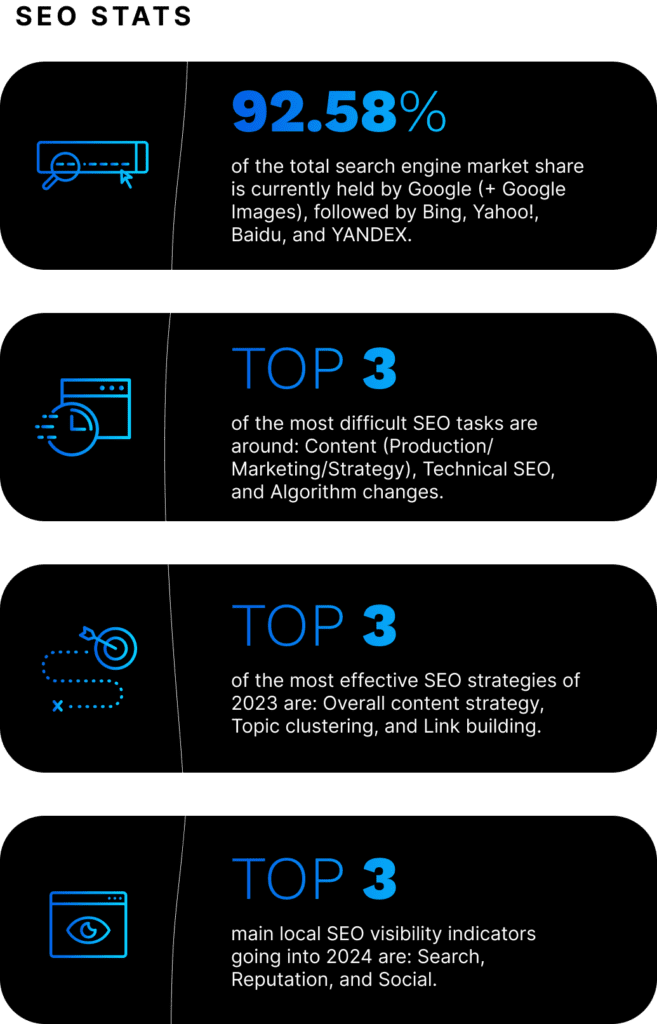
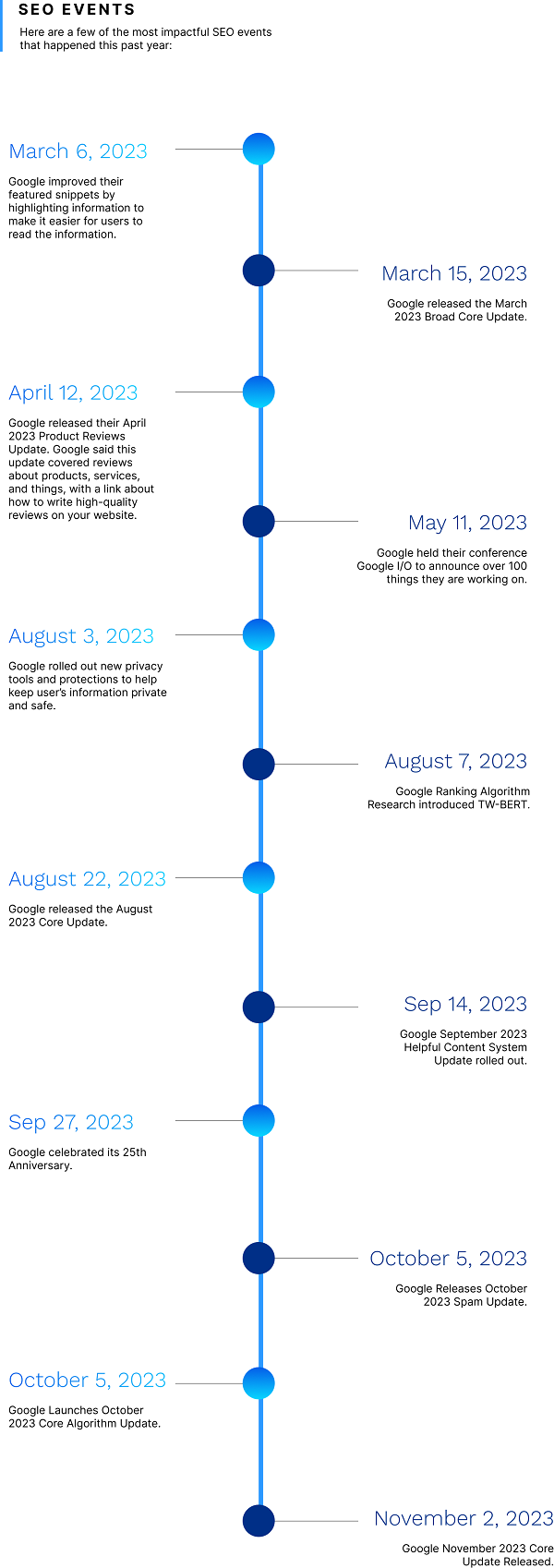
Structured Data
HowTo and FAQ Schema became two lucrative tactics for SEOs and content marketers trying to acquire rankings in SERP features like PAA (people also ask) and featured snippets.
This schema helped their content rank higher and achieve more traffic, but Google realized these tactics were being abused, and unhelpful content was starting to rank. Rather than continue unchecked promotion of unhelpful content, Google removed the tactic altogether for anyone who is not a recognized government or health website.
Google announced in October 2023 that they have stopped using a set of rich results. HowTo structured data is no longer being used and FAQ data is only shown for well-known government and health sites.
 [Katie Stone] – [SEO Specialist at Leadhub]
[Katie Stone] – [SEO Specialist at Leadhub]
“Because LocalBusiness schema is not being used in a way that drives unwarranted traffic, I have significant doubts Google will move away from it, at least in 2024. There’s always the possibility that schema will become irrelevant as Google’s machine learning and algorithm gets stronger, but for now, SEOs and content marketers should continue using schema best practices.”
While these forms of structured data may be discontinuing, it doesn’t mean marketers shouldn’t stop their SEO efforts in this area. The reason this is helpful is due to the fact that optimizing for these snippets helps businesses aim for the top positions in SERP results.
Condensing knowledge and content into neat, bite-sized, answers and responses helps directly address common search queries. It also helps increase business’ chances of landing prime spots, building brand awareness, strengthening brand authority on specific topics, and staying top of mind with potential customers.
All of these benefits and more by offering searchers quick, satisfying answers and improving user experience through fewer clicks. Marketers and SEOs should continue to have this focus in mind going forward into 2024.
Voice Search
Voice search is poised to be a transformative force in SEO as we move into 2024. More individuals have been embracing voice-activated AI assistants such as Siri, Alexa, and Google Assistant. In fact, 72% of US consumers are engaging with voice search through digital assistants. In 2024, the number of active voice assistant devices worldwide will double, reaching a total of 8.4 billion units. With this in mind, the way consumers interact with search engines is evolving. This shift has significant implications for voice search and SEO strategies:
Conversational Queries
Voice search is more conversational in nature. Users tend to ask complete questions or make more natural language requests. SEO strategies need to adapt to these longer, more context-rich queries. Optimizing for long-tail keywords and question-based content is crucial moving into 2024. Your business can also start by using specific keywords such as, “best,” “easy,” “free,” “top,” “list,” etc. These specific keywords in voice searches are predicted to increase by 20%.
High-quality, informative content is also more likely to be recommended by voice-activated assistants. SEO efforts should prioritize creating content that provides clear, concise, and valuable answers to user queries.
Featured Snippets
Voice-activated devices often read aloud the featured snippets from search results. Just like we mentioned in the Structured Data section, SEO efforts should focus on securing the coveted “position zero” by providing concise, informative answers to common questions within your content. This can increase the chances of your content being selected for voice search responses.
Local SEO
Voice searches frequently involve local intent, such as “near me” queries. We should expect a major surge in “near me” and local searches, which makes up 76% of voice searches, set to triple as users look for local business info directly. Businesses must prioritize local SEO strategies to ensure their locations are easily discoverable via voice search. This includes optimizing Google Business Profile listings, securing positive reviews, and ensuring location data accuracy.
Mobile Optimization
Given that many voice searches happen on mobile devices, it’s vital to have a mobile-friendly website. Pages should load quickly, be well-structured, and provide a seamless user experience. Mobile optimization is not only a ranking factor but also enhances user satisfaction.
User Experience
Voice search is about user convenience. Optimizing the user experience on your website, including navigation, site speed, and overall usability, is essential. A positive experience can lead to higher rankings and greater visibility in voice search results.
Privacy Considerations
With voice search, privacy concerns are heightened. Be transparent about data usage and ensure that your website complies with privacy regulations to build trust with users.
In 2024, the growing adoption of voice search requires SEO professionals to adapt their strategies to cater to this specific, evolving search behavior.
Optimizing for voice search isn’t just about keyword targeting; it’s about understanding user intent and providing valuable, concise answers in a conversational tone. It is predicted that around 80% of voice searches are to be conversational by 2024, diverging from traditional search methods. Businesses that stay ahead of this trend and tailor their SEO efforts accordingly are likely to gain a competitive edge in the digital marketing landscape.
Keyword Strategy
Keyword strategy remains a cornerstone of effective Search Engine Optimization (SEO) in 2024. However, it’s undergoing significant changes to adapt to evolving search engine algorithms and user behavior. Here’s how keyword strategy is playing a crucial role in the digital marketing landscape:
Semantic Search
Search engines have become more sophisticated in understanding context and user intent. Instead of just focusing on individual keywords, SEO professionals are now optimizing for semantic search, which means understanding the meaning behind the words. This involves creating content that addresses the broader topic and related concepts around a keyword rather than just targeting exact match phrases.
Long-Tail Keywords
Long-tail keywords, which are more specific and typically longer phrases, are gaining importance. Users are becoming more conversational in their search queries, especially with the rise of voice search. Optimizing for long-tail keywords can help you capture these more natural language searches.
User Intent Optimization
Search engines such as Google and Bing aim to provide users with the most relevant results based on their intent. Understanding user intent and aligning your content with it is crucial. Keywords should reflect the specific intent of the user – whether it’s informational, transactional, commercial, or navigational.
Topic Clusters
Rather than focusing on individual keywords, SEO is shifting toward creating topic clusters. This involves creating pillar content that covers a broad topic comprehensively and then supporting it with related content pieces. This signals to search engines that your website is an authority on a particular subject.
 [Andrew Priobrazhenskyi] – [CEO at DiscountReactor]
[Andrew Priobrazhenskyi] – [CEO at DiscountReactor]
“I would suggest that keyword research is the foundation of search engine optimization (SEO). However, as Google’s natural language processing (NLP) technology has become more sophisticated, effective keyword targeting has become a more nuanced and intricate process.
No longer should landing pages and blog posts be optimized for single keyword objectives. Google positions our landing pages for multiple keywords regardless, so 2024 is the year to strive for greater success.
Clustering keywords is a sophisticated technique for boosting your overall keyword rankings. It entails the identification of multiple keywords with similar search intent and the development of web pages that target these clusters.”
Keyword Localization
Local SEO is gaining prominence, particularly for businesses serving specific geographic areas. Optimizing for location-specific keywords and “near me” searches is vital for brick-and-mortar businesses.
AI and Machine Learning
AI-driven tools can assist in keyword research by analyzing user behavior and predicting keyword trends. They can also help in optimizing content and tracking rankings more effectively.
In 2024, the focus of keyword strategy in SEO is shifting from a simple keyword-centric approach to a more comprehensive and user-centric one. SEO professionals need to understand user intent, adapt to evolving search algorithms, and create high-quality, contextually relevant content that addresses the broader topics their audience is interested in. Keyword research and optimization remain critical, but they are now part of a broader content and user experience strategy.
Search Generative Experience (SGE)
SGE stands for Search Generative Experience and is Google’s approach to transforming the SERP (search engine results page) experience with generative AI. As it stands currently, people have to opt in to use SGE in their Google searches.
In the past, Google’s tested numerous SERP feature updates and enhancements to the search experience, much of which have been implemented across the board impacting all search experiences. This is why digital marketing experts speculate that Google will roll out the generative AI SERP experience in the near future, possibly in early 2024.
It’s predicted that websites can lose over half of their traffic as a result of not ranking in SGE. The ranking results within SGE can also differ from what’s displayed below in the traditional organic SERP listings.
 [Maja Teagle] – [SEO Manager at Boostability]
[Maja Teagle] – [SEO Manager at Boostability]
“It’s been a topic of discussion for a while with publications like Search Engine Journal and Marie Haynes, but it seems to have fallen off the radar for most marketers. After attending an informative webinar on SGE and how to prepare for its rollout hosted by Search Engine Land and Agile SEO, our team is heavily focused on running impact assessments and page-by-page tests to see whether pages ranking well in SERPs will in turn rank within Google’s generative AI.
Instead of waiting to see if SGE will become permanent, we’re taking a proactive approach in preparing for it NOW.”
AI
Artificial Intelligence (AI) has taken the world of digital marketing by storm, reshaping the landscape in ways previously unimagined. As we venture into 2024, it is impossible to overstate the profound impact AI has made on the strategies and tactics used to engage and convert audiences online. What was once considered a promising tool has evolved into an indispensable force that has effected every area of the digital marketing sphere.
In this report, we explore the power of AI and its far-reaching implications for businesses seeking to navigate the ever-shifting currents of the digital marketplace. Join us as we unravel the dynamic, innovative, and often game-changing applications of AI in digital marketing, and discover how this technology continues to redefine the rules of the digital playing field.
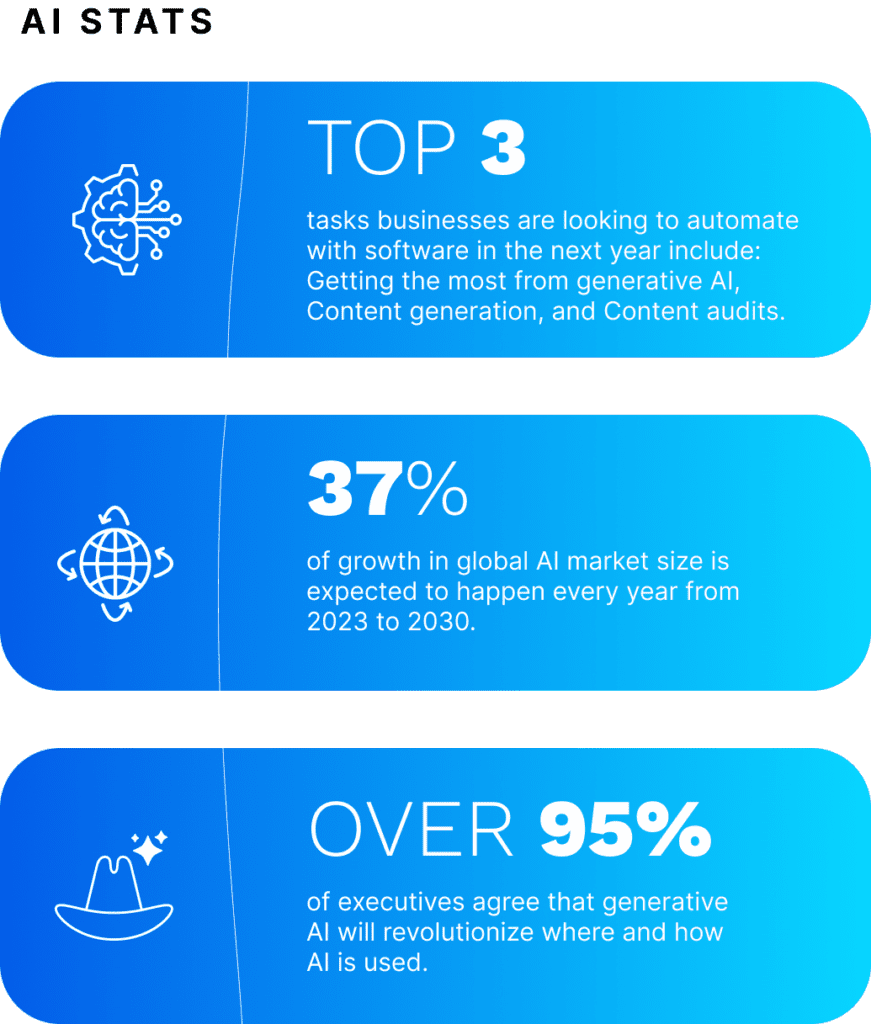
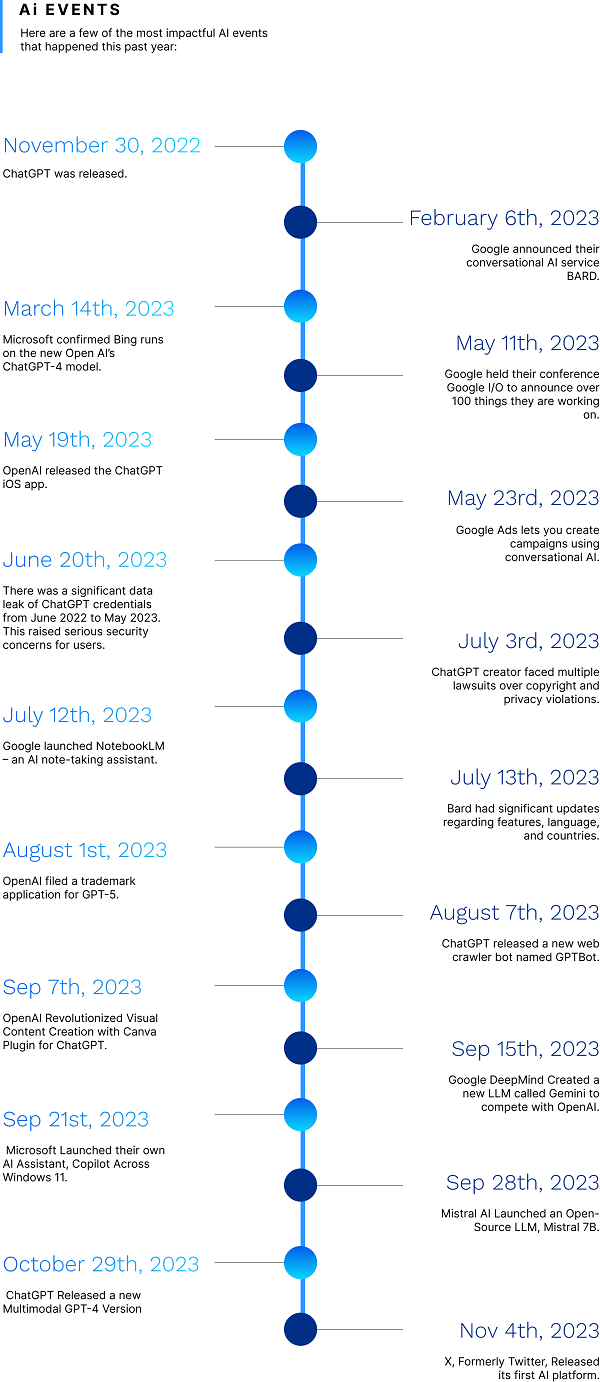
[Kimberli Lewis] – [General Manager & Board President at Siinda]

“As we approach 2024, businesses must navigate a rapidly changing digital landscape with new technologies and trends emerging at an unprecedented pace. At Siinda, we understand the importance of staying ahead of the curve and empowering our members to succeed in a highly competitive environment, therefore, as we approach 2024, businesses must consider several factors that will impact their success.
The changing consumer landscape, increased competition, and new technologies will be impacting how small and medium businesses (SMBs) do business in 2024. To prepare, SMBs must embrace a culture of innovation, invest in their employees and work processes, and continuously adapt to new trends and technologies.
Digital marketing is an essential tool for SMBs to connect with their audience and stand out in a crowded marketplace. To best utilize digital marketing, businesses must focus on creating engaging content, leveraging social media channels, and optimizing their website for search engines. It’s also crucial to track and measure performance to identify areas for improvement. With the variety of digital marketing channels available, SMBs must work with digital marketing experts to find out which channel is best for their target customer base or target market. They should also embrace new technologies that can help them better target customers and market segments, and they can do this by using AI.
AI is revolutionizing the way businesses operate, enabling greater efficiency, automation, and personalization. As businesses prepare for 2024, it’s crucial to understand the opportunities and challenges associated with AI. By leveraging AI tools, SMBs can streamline their operations, optimize customer service, and gain valuable insights into data. However, SMBs must also consider the ethical and legal implications of AI and ensure that they are prepared to handle these challenges. According to the Siinda Landscape survey, only 30-80% of SMBs (varies by country) have grasped the concept of data protection and have integrated this into their practices, and AI will add another layer of complicity that is very difficult for SMBs to understand.
Although AI can help SMBs become more efficient, the impact of AI on job security is a topic of much debate. While some fear that AI could lead to widespread job loss, others believe that it will create new opportunities and lead to jobs that don’t currently exist. For small and mid-sized businesses, AI can bring increased efficiency and innovation, which can ultimately lead to sustainable growth and job creation. Siinda supports businesses in investing in re-skilling and up-skilling their workforce to adapt to a changing job landscape.
As SMBs prepare for 2024, they must embrace digital marketing, AI, and a culture of innovation to stay ahead of the curve and thrive in a digital world. Siinda’s global network provides members with the latest insights and resources to achieve success and navigate a rapidly changing landscape. By leveraging the power of the community, Siinda supports companies serving SMBs worldwide, and by joining Siinda, companies can unlock the potential for growth and success.”
AI & SEO
In 2024, the synergy between Artificial Intelligence (AI) and Search Engine Optimization (SEO) has reshaping the digital marketing landscape.
[Kristine Pratt] – [Director of Marketing at Boostability]

“It’s truly amazing how far AI has come in just a year. I remember my prediction last year talking about content marketing and AI generated content pairing up with marketers to make something truly great. Today, AI can power images, video, content, can give you conversational search results, or help you explain a topic. It’s truly expanded at a rapid rate with hundreds of thousands of AI tools now available for everything from generating a trip itinerary to animating family photos.
In 2024, we’ll see the power of AI in search engines. The integration of Chat GPT into Bing search results is only the beginning. Google is testing and rolling out Search Generative Experience (SGE). It gives AI results and explanations, not snippets of existing content, and links for further exploration. This will dramatically change the search landscape with more zero click searches, and big changes in the SEO game. It’s no longer a matter of just high ranking, but having structured data and concise content that will help a website be a part of the AI-driven results.”
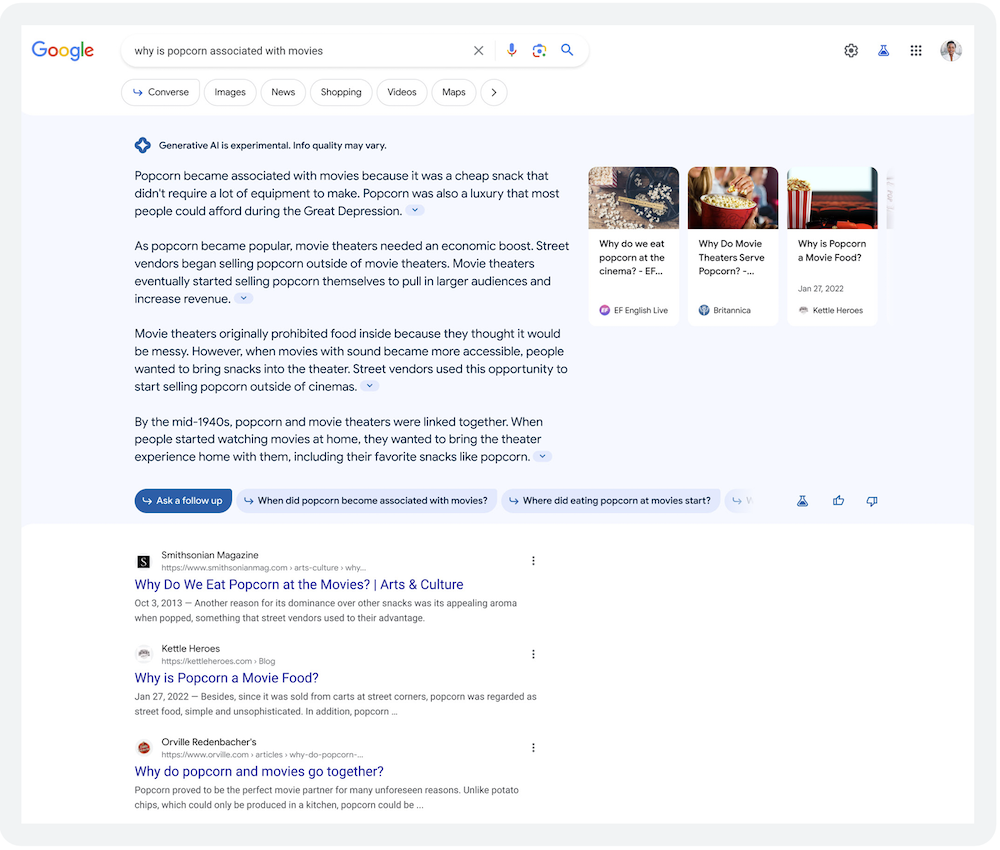
*Example from Google of SGE results*
AI has become a driving force behind SEO, offering marketers powerful tools and strategies to enhance their online visibility and connect with their target audience in more effective ways such as:
Advanced Keyword Research
AI-powered tools are revolutionizing keyword research. Machine learning algorithms can analyze large datasets to identify not only the most relevant keywords but also user intent. This could allows marketers to create content that aligns with what their audience is searching for.
Content Optimization
AI helps in content optimization by analyzing existing content and suggesting improvements. It can identify opportunities for on-page SEO enhancements, such as optimizing meta tags, headings, and content structure, to improve search engine rankings.
Natural Language Processing (NLP)
NLP has become a game-changer for SEO. Search engines like Google increasingly use NLP to better understand context and intent behind user queries. As NLP technology evolves, creating content that sounds similar to how individuals speak is advanced. It’s becoming not just about keywords; it’s about capturing the essence of user queries, addressing their real questions, and speaking their language.
Voice Search Optimization
As voice-activated AI assistants gain popularity, optimizing for voice search is essential. AI can help SEO professionals understand the nuances of voice search queries and adapt content to align with conversational search patterns.
Technical SEO
AI can automate and streamline technical SEO tasks, such as identifying and fixing broken links, optimizing site speed, and enhancing mobile-friendliness. This not only improves user experience but also positively impacts search rankings.
Local SEO
AI is playing a crucial role in local SEO, helping businesses optimize their online presence for location-based searches. AI can manage and update business listings, analyze user reviews, and enhance the accuracy of local search results.
The integration of AI into SEO strategies is not about replacing human expertise but rather augmenting it. Marketers who harness the power of AI in their SEO efforts are better equipped to stay ahead in an increasingly competitive online landscape. AI’s ability to process vast amounts of data, adapt to changing algorithms, and optimize content for user intent positions it as an invaluable asset in the world of SEO for 2024 and beyond.
AI & Content
One of the most significant digital marketing trends in 2023, and going into 2024, is the co-existing relationship between artificial intelligence (AI) and content marketing. AI is playing a pivotal role in revolutionizing content creation, personalization, and distribution, transforming the way businesses connect with their target audiences. Here are a few examples of this:
Content Generation
AI-powered content generation tools are becoming more sophisticated and prevalent. These tools can automatically produce articles, product descriptions, and even social media posts, saving marketers and business’ time and resources. While they cannot completely replace human creativity, it’s important to note that AI content should always be proof read or edited to add additional credibility and value to the content.
 [Natalia Dávila Merlo] – [Content Marketing Manager at Ling]
[Natalia Dávila Merlo] – [Content Marketing Manager at Ling]
“A smart use of AI to improve content development and quality can benefit individuals. This detailed guide shows how to use AI to create high-quality content:
- Idea Generation and Topic Research: AI algorithms can identify hot themes, content gaps, and audience interests from massive data sets. People may improve their content ideas and follow trends by using AI-driven insights.
- Analysis and Optimization of Keywords: AI can help you find keywords that resonate with your target audience. Organically including these keywords in your article can boost search engine rankings and readership.
- Content Creation: AI-powered content generators can help create initial drafts or outlines from input. These generated drafts can be beneficial, but people must add their voice, creativity, and knowledge.
- Grammar & Style Checking: AI-powered language processing systems can spot grammatical, spelling, and consistency issues in text. So the final text is polished and error-free.
- Content Improvement: AI can recommend ways to improve content readability, coherence, and engagement. Restructuring sentences, suggesting synonyms, or identifying places for improvement are examples.
- Personalization: AI can analyze user preferences, behavior, and interactions to personalize content. This allows personal content production, increasing engagement and loyalty.
- Visual Content Creation: AI can design infographics, charts, and images to compliment your writing. Visuals make the material more appealing and understandable.
- Performance Analytics: Use AI-powered analytics to track content performance. These tools can help you improve your content strategy by revealing engagement analytics, audience demographics, and conversion rates.
- A/B Testing: A/B testing content variations with AI can help you find what your audience likes. This iterative technique improves content quality.
- Considerations: Ethics AI can automate content generation, but it must be ethical and reflect your brand’s values. To avoid bias and maintain authenticity, human inspection is essential.
- Continuous Learning: Keep up with content creation AI advances. Try multiple AI tools and methods to find the greatest fit for your content and goals.
Find the perfect mix between automation and creativity while using AI in content development. AI can improve efficiency and insights, but humans offer authenticity, emotional resonance, and unique views of the material. AI can help people create high-quality, interesting content by supporting them rather than replacing them.”
Content Optimization
AI-driven analytics tools are helping marketers optimize their content strategies. AI can analyze data from various channels, such as website traffic, social media interactions, and email click-through rates, to determine what content resonates most with the target audience. This data-driven approach ensures that marketing efforts are more laser-focused on what works best.

[Stéphanie Génin] – [CMO at Uberall]
“As businesses gear up for 2024, it is imperative for them to recognize the profound impact of artificial intelligence (AI) on local marketing strategies. AI technologies, such as machine learning algorithms and natural language processing, have become increasingly sophisticated, offering businesses unprecedented opportunities to enhance their marketing efforts at the local level.
One of the key aspects that businesses need to understand is the customization and personalization capabilities that AI brings to the table. Through AI-powered data analysis, businesses can gain valuable insights into their customers’ preferences, behaviors, and demographics, enabling them to create highly targeted and personalized marketing campaigns. By harnessing AI, businesses can tailor their messages to resonate with specific local audiences, thus increasing engagement and conversion rates.
Furthermore, businesses should be aware of the role AI plays in automating repetitive tasks and streamlining marketing operations. AI-driven automation tools can handle routine tasks like email marketing, social media posting,reputation management, allowing businesses to allocate their resources more efficiently. This automation not only saves time but also ensures consistent and timely communication with local customers, across locations, fostering trust and loyalty.
Additionally, AI-powered chatbots have become invaluable assets in providing real-time support to customers, addressing their queries, and guiding them through the purchasing process. Businesses that integrate these AI solutions into their local marketing strategies can enhance customer satisfaction and deliver a seamless shopping experience. They will win 2024.
From a local marketing perspective, businesses must also consider the significance of AI in predictive analytics. By analyzing historical data and patterns, AI algorithms can forecast local market trends and consumer behaviors. This foresight enables businesses to anticipate customer demands, optimize inventory levels, and launch targeted promotions at the right time. Predictive analytics powered by AI empowers businesses to make data-driven decisions, ensuring that their marketing efforts are not only effective but also adaptive to changing local market dynamics.
Additionally, businesses need to prioritize data security and privacy as they leverage AI in their local marketing initiatives. With the increasing reliance on customer data for personalization and targeting, businesses must take the right cybersecurity measures to protect sensitive information. Building trust with customers by ensuring the responsible use of their data is essential in fostering long-term relationships and sustaining a positive reputation within the local community.
In conclusion, as businesses prepare for 2024, embracing AI technology is not just an option but a necessity in the realm of local marketing. Understanding the customization capabilities, automation benefits, predictive analytics, and the importance of data security are pivotal for businesses to thrive in the ever-evolving landscape. By harnessing the power of AI, businesses can create compelling, personalized experiences for their local customers, drive engagement, and ultimately, achieve sustainable growth in the competitive market.”
Personalization
AI is enabling hyper-personalized content recommendations and experiences. Through machine learning algorithms, AI analyzes user behavior and preferences, allowing businesses to deliver highly tailored content to individual consumers. Over 50% of large enterprises will use AI by 2024. Using this personalization with AI not only enhances user engagement but also drives conversions and customer loyalty.

[Peter Michaels] – [CEO of Yeespy]
“Businesses should leverage AI for data analysis and pattern recognition while ensuring their content resonates with human audiences. AI can assist in finding optimization opportunities, but the final content should reflect the authentic voice of the brand.
Targeting specific industries and segments remains pivotal. Personalized content speaks directly to user needs, enhancing engagement and conversion rates. Industries can craft tailored strategies to capture their target audiences effectively.”
Voice Search Optimization
As voice-activated AI assistants like Siri, Alexa, and Google Assistant gain popularity, optimizing content for voice search is crucial. The NLP Market is expected to be worth over $40 billion in 2025. With this in mind, AI algorithms help in understanding natural language processing (NLP) queries, allowing businesses to create content that aligns with voice search trends.
The AI and content marketing collaboration is not about replacing human creativity, but rather enhancing it. Marketers who leverage AI tools in content creation, personalization, optimization, and distribution are better equipped to deliver high-quality, relevant, and timely content to their audiences. As the digital marketing landscape continues to evolve in 2024, the effective integration of AI in content marketing strategies will be a key differentiator for businesses seeking to stand out and engage their target audience.
Job Security
While AI is revolutionizing the way businesses target, engage, and understand their audiences, it is also raising questions about job security for marketing professionals. The implementation of AI has automated numerous routine tasks, such as data analysis, A/B testing, and even content generation, which were previously handled by marketing specialists. This has led to concerns about job displacement and the evolving role of human marketers.
 [Stefan Campbell] – [Owner of The Small Business Blog]
[Stefan Campbell] – [Owner of The Small Business Blog]
“People in the tech industry have long wondered whether or not a robot would take their job one day. This worry has now trickled down to the masses of people who don’t work in tech, who are afraid that they too could be replaced by AI. I don’t think people should focus too much on whether AI will take their jobs, but rather, on learning to utilize AI and any other new innovations that come along, so that they can pivot if needed. It’s probably a really good way to keep hanging on to your job.”
AI is creating new opportunities for marketing professionals. It’s empowering marketers to focus on higher-level strategy, creativity, and relationship-building aspects of their roles, which are inherently human skills that AI cannot fully replicate. Rather than replacing marketing jobs, AI is augmenting them, allowing professionals to be more effective and efficient in their work. As AI takes over repetitive tasks, it frees up marketers to concentrate on strategic planning, innovative content creation, and deep customer insights.
 [Jeff Lush] – [Marketing Consultant at Rock Bound Marketing]
[Jeff Lush] – [Marketing Consultant at Rock Bound Marketing]
“I think AI will help job security. Sure, anyone can write prompts and generate AI output, but you still need the institutional familiarity and understanding to determine its quality. I think that AI will have positive impacts on most jobs. I think about the advent of Microsoft Excel in the 80s, the general thought was it would hurt the accounting job market. The opposite happened, businesses needed more analysts and accountants because Excel unlocked so much more information to help managers. I think AI is going to have a similar impact in the medium term. I think it will free up employees to do more challenging work and more impactful work and the basic job functions will be automated or machine handled.”
Moreover, the demand for individuals with expertise in AI and data analysis is on the rise. According to McKinsey, artificial Intelligence is expected to create 133 million new jobs by 2030. Marketing departments are actively seeking professionals who can harness AI technologies and interpret the insights they provide.
[Gavan Thorpe] – [CEO at Boostability]

“I see a key to success in marketing and business in 2024 is the ability to be agile. So many things have changed in the last year that causes us as business leaders to need to test, fail fast, pivot, adapt, test again, and take action on what works. We work in the SEO world where we’re seeing AI transform the industry before our eyes. We’ve had to drastically change the way our company creates content for our customers. We’re closely watching how AI is transforming search results every day. There are dozens of different AI driven search engines, with Google and Bing leading the charge with AI driven results and the rise of zero click searches.
Bottomline, success in this constantly changing world comes down to not being scared to innovate and push what will work for your business. You need to make strategic decisions and not be driven by the latest trends. But know what will work for you, focus on revenue driving items, cut costs and pivot where you can. Then reevaluate in a few months to make sure you’re getting the results you want. 2024 will continue to be a year of innovation that you need to stay on top of to ensure you don’t get left behind with the dramatically evolving changes to consumer behavior.”
Therefore, marketing professionals who acquire AI-related skills and adapt to this evolving landscape are likely to find themselves in high demand, enjoying a level of job security and career growth that aligns with these digital marketing trends of 2024.
Content Marketing
In the realm of digital marketing, where engaging, informing, and inspiring audiences is paramount, content marketing reigns supreme as the heartbeat of strategy and communication.
As we step into 2024, it is impossible to ignore the remarkable impact that content marketing has made on the way businesses and brands connect with their customers in the digital space. It has grown from being a mere buzzword to an indispensable, transformative force, influencing consumer decisions and shaping the digital marketing landscape in unprecedented ways.
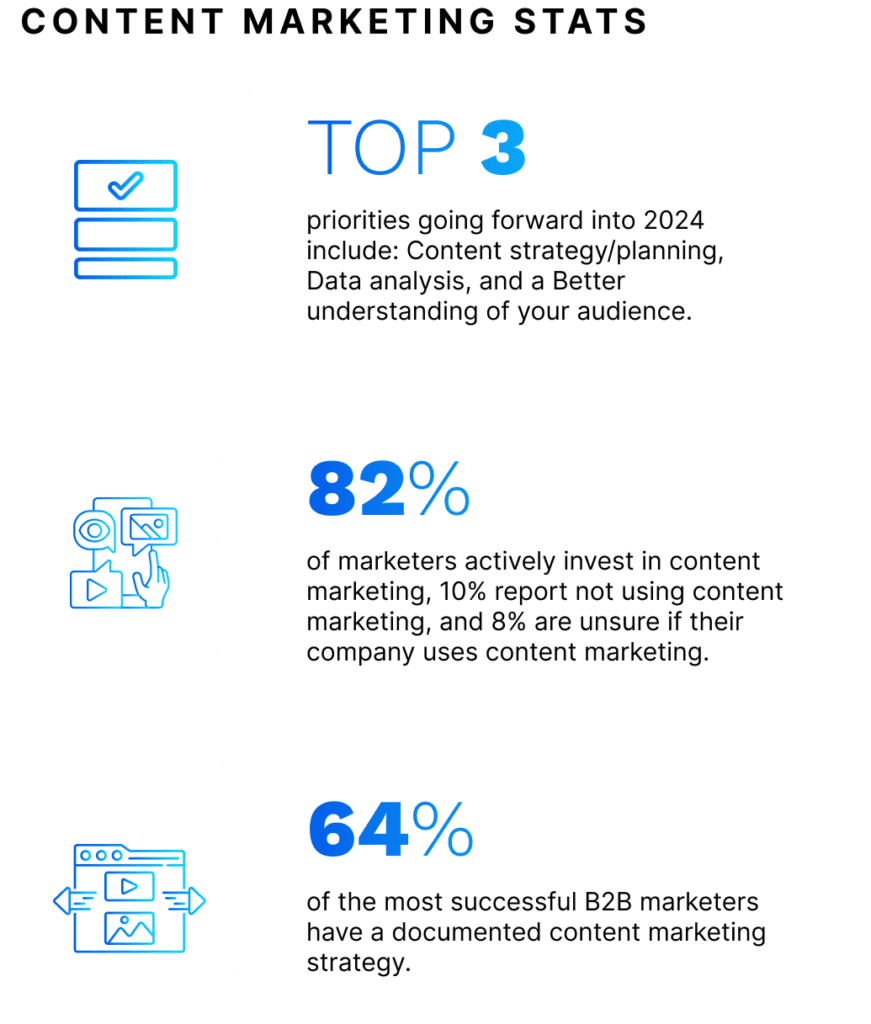

Personalization
Personalization is emerging as a pivotal trend in the realm of content marketing, reshaping the way businesses engage with their audiences. This evolving landscape emphasizes the significance of delivering tailored content experiences to individual users. Here’s how personalization is influencing content marketing strategies:
Audience-Centric Content
Content marketing is shifting from a one-size-fits-all approach to a highly audience-centric model. By leveraging data and analytics, businesses are gaining deeper insights into their users’ preferences, behaviors, and demographics. This information allows for the creation of content that resonates specifically with different audience segments.
 [Gauri Manglik] – [CEO & Co-Founder at Instrumentl]
[Gauri Manglik] – [CEO & Co-Founder at Instrumentl]
“In my experience, businesses need to know that the more personal the approach they take, the more likely it is that they’ll connect with their audience.
You don’t have to be a social media influencer or celebrity to create content that resonates with your customers and prospects. You just have to be authentic—and genuine.
It’s not enough to just say “I’m sorry” or “we care about you” anymore; people want proof that you mean it. If someone can’t tell by reading your words or watching your videos that you truly believe in what you do, then how can they trust anything else that comes out of your mouth?
That means making sure your business has a solid foundation built on trustworthiness so that when things go wrong (and they will), people will still want to hear from you—and that starts by being honest about who you are and what your brand stands for.”
“I think that in 2024, content marketing will be more about the individual than the company.
We’ve seen this trend starting to happen already, with content marketing becoming less about the product itself and more about the user experience. I believe this will continue.
I think we’ll see companies focusing on creating content that helps their customers feel understood, connected, and engaged–and then using those feelings as a way to sell them something.
This means that content marketing will become less about pushing products onto people and more about helping consumers find products they’re actually interested in.”
Dynamic Content
Personalization is enabling the creation of dynamic content that changes in real-time based on user interactions. For example, website content can adapt to a user’s location, previous browsing history, or past interactions with the brand, creating a more engaging and relevant experience.
[Roberto García] – [Head of Partnerships at Marketgoo]

“Businesses need to consider what role they want AI to play in terms of the content they publish. There are already concerns about the proliferation of monotonous and repetitive content from those using AI tools for content generation; however, businesses need to find a way to leverage the convenience and cost-effectiveness of these tools while also investing in human writers and content creators. Those who can convey authority and establish a distinctive voice are well positioned to outperform auto-generated content.
In terms of SEO, businesses would do well to focus on addressing super specialized queries that AI may struggle to answer accurately. Their SEO work should prioritize building credibility and authority within specific niches to maintain visibility.”
User-Generated Content
Encouraging users to create content, such as reviews, testimonials, or user-generated product content, adds a personal touch to marketing efforts. This user-generated content can be leveraged to build trust and authenticity among potential customers.
Interactive Content
Personalization extends to interactive content formats like quizzes, surveys, and polls. These allow users to engage with the content in a more personalized way, resulting in a more enjoyable and memorable experience.
AI-Driven Content Creation
AI is being used to generate personalized content, such as product descriptions and email messages. These AI-generated pieces can be tailored to individual preferences and needs.
Social Media Personalization
Social media platforms are increasingly providing tools for delivering personalized content to users based on their interactions and interests. Personalized social media ads, stories, and content recommendations are becoming more effective.
Localization
Personalization often includes localization, tailoring content to specific regions and languages. This ensures that the content is culturally relevant and resonates with diverse global audiences.
The trend of personalization in content marketing for 2024 reflects the growing demand for more meaningful and relevant interactions with brands. By leveraging data and technology, businesses can create content that speaks directly to individual preferences and needs, enhancing user engagement, loyalty, and ultimately, conversion rates. The era of one-size-fits-all content is making way for a more personalized, data-driven, and user-centric approach to content marketing.
E-E-A-T
E-E-A-T (Experience, Expertise, Authoritativeness, Trustworthiness) is continuing to play a pivotal role in content marketing, especially in the realm of SEO and content quality. E-E-A-T is a set of guidelines outlined by Google in its search quality evaluator guidelines, and it has become a crucial factor for determining search engine rankings and the overall trustworthiness of online content. Here’s how E-E-A-T is shaping content marketing strategies:
Experience
Experience is now a key component of E-E-A-T and is especially important in a digital world moving toward generative AI content. AI can never demonstrate true experiences of anything. At best, it can make assumptions about the human experience, but the content it generates won’t be creative or unique. Writing unique, original content is what helps make the experience factor the best it can be for search engines.
 [Daniel Florido] – [Director at Pixelstorm]
[Daniel Florido] – [Director at Pixelstorm]
“From E-A-T to E-E-A-T: Expertise, authority, and trustworthiness-demonstrating content is no longer sufficient. Google recently declared that experience is now taken into account. Due to the additional E in the equation, I suggest it is now a good idea to check your current content—possibly blogs that have been declining—and make sure it complies with the new standard in order to gain back lost SEO traffic.”
Expertise
Content marketing is increasingly emphasizing the expertise of both the content creators and the information presented. Creating content that demonstrates expertise in a specific subject matter is crucial for gaining credibility. This often involves working with subject matter experts, citing reputable sources, and providing detailed and well-researched information.
Authoritativeness
Businesses and content creators are focusing on building their authority within their respective niches. This involves consistently producing high-quality content, earning backlinks from reputable sources, and showcasing thought leadership. Authoritative voices are more likely to be trusted by both search engines and audiences.
Trustworthiness
Trust is paramount in content marketing. Building trust with the audience and search engines is vital for long-term success. Trustworthiness involves citing accurate information, using trustworthy sources, and maintaining transparency in content creation. Avoiding clickbait and sensationalism is critical to maintain trust with the audience.
Reputation Management
Content marketing strategies often include reputation management efforts. Businesses are actively monitoring and managing their online reputation, including online reviews, social media presence, and responses to customer feedback. Positive online reputation contributes to trustworthiness.
Quality Content
E-E-A-T encourages the creation of high-quality, well-researched, and informative content. Content that adds value, solves problems, or answers questions is more likely to be trusted and shared. This approach not only satisfies user intent but also aligns with search engine algorithms’ preference for authoritative and trustworthy content.
 [Austin McNair] – [Senior Marketing Manager at Hinge]
[Austin McNair] – [Senior Marketing Manager at Hinge]
“As marketers prepare for 2024, they need to understand that the quality of their content will need to improve. With the rise of generative AI tools, the amount of basic informational content is going to increase substantially.
Standing out from the noise will mean investing in marketing strategies that bring a unique voice to their brand. We see evidence of this trend towards higher quality content in the latest edition of Hinge’s High Growth Study.
The fastest-growing companies aren’t just producing blog posts, they are producing research reports. They aren’t just logging in to network on social media, they are sharing original video content from their recent webinars or podcast episodes. These kinds of content formats require more initial investment to produce but reap benefits for their originality and personality.”
Citing Sources and References
Content creators are placing a stronger emphasis on citing sources and references to support claims and statements. This not only demonstrates expertise but also adds credibility to the content.
In-Depth Content
In-depth, comprehensive content pieces are gaining favor. Longer articles and guides that thoroughly explore a topic are seen as more valuable and trustworthy. These pieces often include citations, expert quotes, and detailed explanations.
Expert Contributors
Collaborating with recognized experts in a field and having them contribute to content creation is becoming more common. Expert contributions can boost the overall E-E-A-T of the content and the website as a whole.
In 2024, content marketing strategies are increasingly focused on aligning with E-E-A-T principles to create content that not only ranks well in search engine results but also establishes trust and credibility with the audience. This approach is instrumental in fostering long-term relationships with users and in demonstrating to search engines that the content is of high quality and provides real value. E-E-A-T will continue to be a critical factor in the success of content marketing efforts.


 [
[ [
[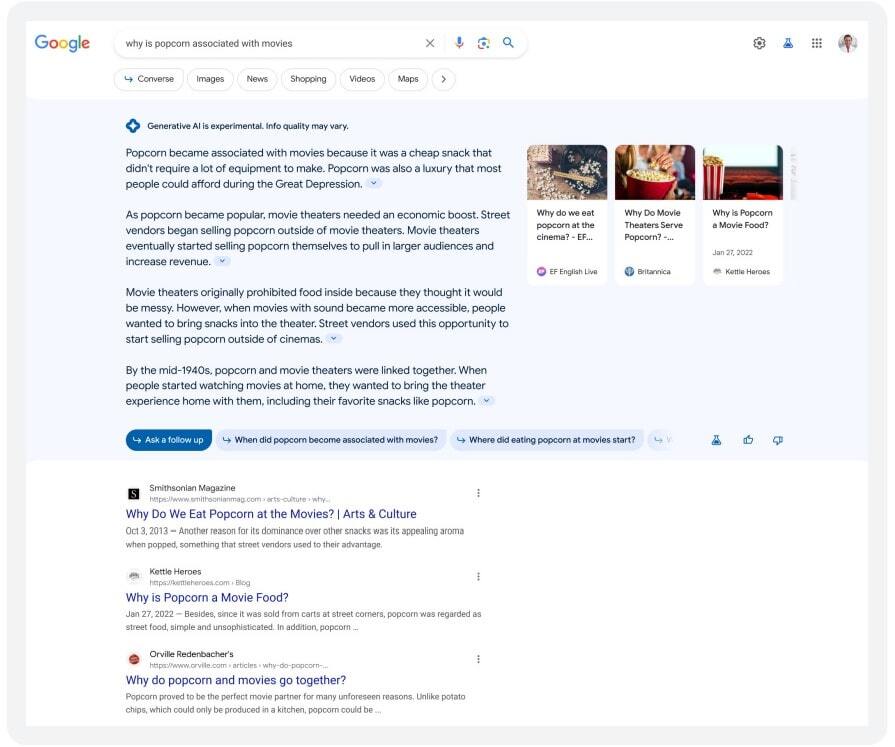

 [Natalia Dávila Merlo] – [Content Marketing Manager at
[Natalia Dávila Merlo] – [Content Marketing Manager at  [
[ [
[ [
[ [Daniel Florido] – [Director at
[Daniel Florido] – [Director at  [
[